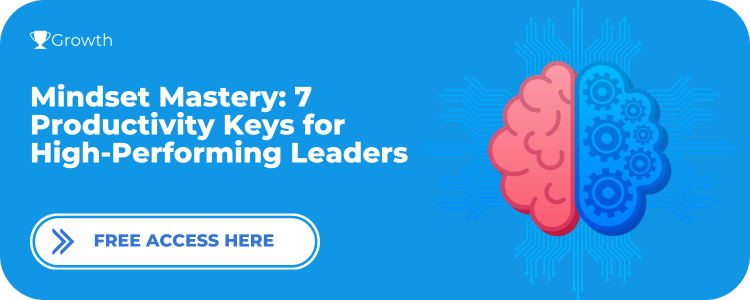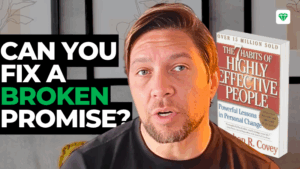
✅ FREE ACCESS: Mindset Mastery: 7 Productivity Keys For High-Performing Leaders
Understanding Mistakes and Failure
In the book The Millionaire Fast Lane by MJ DeMarco, there’s this intriguing passage that says like this:
“All your mistakes, failures, and triumphs reflect on your choices. Are you in a situation because you put yourself there?”
What’s intriguing about this passage is that he makes a differentiation between mistakes and failures.
And the question is, what is the difference between mistakes and failures?
Mistakes vs. Failures: Defining the Differences
The first thing you need to understand between mistakes and failures is that:
- Mistakes are the things you didn’t know would go wrong.
- Failures are the things you knew all along would go wrong.
Mistakes are made of miscalculations, and failures are made of negligence.
That’s why there is no lesson to be learned from failure because you were like that since the beginning.
The failure happened because you neglected your responsibilities; there is no novelty, no learning, no new pieces of information, there is nothing.
Mistakes, on the other hand, are the most informative streams of media you will ever encounter.
Because by pushing yourself beyond the limits of your current capacity, you make miscalculations that produce obstacles, and those obstacles are made of new pieces of information.
And information means “in formation”.
That means every time you make a mistake, you become something more, something better.
So one of the most important things you need to master in your productive life is to learn how to avoid failures and embrace mistakes.
How to avoid failures
Well, imagine that your consciousness is a room full of doors.
Some of these doors are open, and some of these doors are closed.
The open doors are habits you already have, and the closed doors are things you have never done.
Every decision you make produces four different interactions with those doors.
Remember, those doors are in your consciousness, inside this room that we’re calling time.
Consciousness and these doors lead to existential places.
So what are the four interactions?
Every decision you make can:
- Keep a door open
- Close a door
- Keep a door closed
- Open a door.
The lesson is don’t open doors to places you don’t want to be and don’t close doors to places you need to be.
Don’t do the things you don’t want to become.
How to Embrace Mistakes
The first thing is, tell the truth. Even if it gets you into trouble.
Why is that?
Because we don’t see the world. There’s too much world to see.
What do we do instead is to create a map that overlays the world, so we can have meaning, focus, and security.
And to be honest, that map will do fine if the future always duplicated the past.
But that’s not how life works.
Life’s like music; it has some patterns that repeat and other patterns that transform.
We use memory to deal with repetition and we use conscious decision to deal with novelty of life.
So when you lie you break that moral compass that allows you to interact with this dynamic of life and act.
“X” won’t mark the spot on your map anymore.
You get lost.
The second thing you need to do to embrace mistakes is not to protect yourself from awkwardness.
Why is that?
Well, there’s this saying in medieval alchemy, in Latin:
“in sterquiliniis invenitur.”
Which means:
“In filth it will be found.”
Carl Jung, the father of analytical psychology, used this term to explain that what you need to see the most will be found where you least want to look.
The most informative things you need to be wiser and stronger are also found in the most painful places.
For example, you have King Arthur and the Knights of the Round Table myth.
They lived in this castle in the middle of the woods, and they’re all looking for the Holy Grail.
Each one of the knights decides to get into the woods where it appears darkest to him.
Which means to find something of great value, like the Holy Grail, the fastest route, the most likely place to find that, is through the place that’s darkest to you, which are the most painful ones.
And if you think like that in practical terms, you can think like this:
Winning all the time is the ultimate losing game.
Why?
Because to win all the time, you have to master the set of abilities needed to play the game that you’re playing at the level that you’re playing.
So you’re winning all the time because you’re in your comfort zone.
And you might ask, what’s the matter? What’s the problem? Can I just be here winning all the time and be happily ever after?
The answer is no. Why?
Because the world around you is constantly moving, and the ground that you’re stepping onto is constantly shifting.
If you keep yourself in your comfort zone, it will come a day that you will stop winning, but the world around you will be so different, the ground that you’re stepping onto will have shifted so much that you won’t be able to catch up, so you lose completely.
So, the game of champions is not winning; the game of champions is progress.
That’s why to have progress, you should never protect yourself from awkwardness.
You should push yourself beyond the limits of your current capacity, learn from those mistakes, allow that new ground that you’re stepping onto to produce miscalculations, produce obstacles that you can analyze, get new pieces of information, and become something more.
That’s why you should embrace mistakes and avoid fearing failures.




